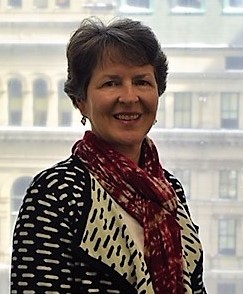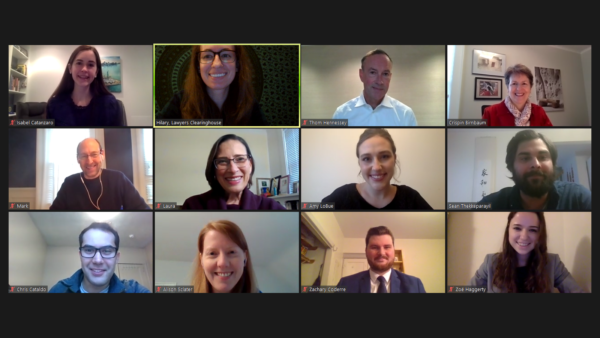Fellow Crispin Birnbaum Believes in the Power of Second Chances
 “There is much more to a human being than what is on their record,” said Clearinghouse Access to Justice Fellow Crispin Birnbaum as she accepted the Adams Pro Bono Publico Award at a virtual event hosted by the Supreme Judicial Court on Wednesday, October 28.
“There is much more to a human being than what is on their record,” said Clearinghouse Access to Justice Fellow Crispin Birnbaum as she accepted the Adams Pro Bono Publico Award at a virtual event hosted by the Supreme Judicial Court on Wednesday, October 28.
It was a well-deserved honor for an attorney who has volunteered hundreds of pro bono hours to her community since 2018, when she retired as General Counsel of the Massachusetts Probation Service and joined the Fellows Program.
The belief that people are complex and deserving of second chances is the driving force behind Crispin’s Fellowship project. Over the past two years she has led more than 100 trainings on criminal records (known in Massachusetts as CORI) law for nonprofit and legal services professionals, as well as volunteer attorneys, veteran and youth support groups, and government agencies, while also helping the Clearinghouse establish and run its stand-alone CORI Clinic for people seeking free legal assistance sealing and expunging their own records.
Even a pandemic hasn’t stopped Crispin. After the shutdown order in late March, she started to offer her trainings virtually, providing in-depth and timely information to empower nonprofits and service organizations to better help their own clients who have records.
The CORI Sealing and Expungement Clinic—offered in partnership with Codman Square NDC, Urban Edge, and the City of Boston’s Project Opportunity—is now operating virtually as well. For every clinic, Crispin joins Clearinghouse staff and a rotating team of volunteer attorneys on Zoom, where the attorneys, equipped with one of Crispin’s invaluable training sessions, handle the client intake process and call on Crispin when they have questions about how to best proceed.
Clients who attend the CORI Clinic have often spent years held back by their records, which can make it difficult, or even impossible, to access housing, employment, and many other opportunities. Frequently, they leave the clinic with a concrete plan of action from their pro bono advocates and a renewed sense of hope for the road ahead.
But, as Crispin is well-aware, there is still so much work to do. Direct service alone cannot overcome a system marred by stigma and racism, where Black people and people of color are much more likely to hold criminal records.
“It is especially important to provide this free legal service for people of color, who also face discrimination in our health care, election, and political systems in a myriad of ways,” she says.
In her time as General Counsel at the Massachusetts Probation Service, Crispin worked to ensure fair treatment for people with records, including creating a process to work with those known as “Dookhan defendants,” who had been wrongfully convicted due to falsified drug lab results in the infamous 2013 scandal. And now, as the pandemic rages on, exposing deepening inequality, Crispin sees a unique opportunity for agencies in Massachusetts to create a more just system for everyone.
“The September 2020 Harvard Law School Study on Racial Disparities in the Massachusetts Criminal Justice System provides a statistically-based roadmap for reform at each entry point to and juncture within our criminal justice system that brands individuals for life,” she says, recommending we take a hard look at the obvious disparities and ask ourselves “Who is being arrested? Who is being held on bail and at what amount of bail? Who is being sentenced to prison and for how long? Who is being given a break at each juncture?”
On the criminal records side, Crispin suggests a mix of statutory and regulatory changes, including making it easier for legal services attorneys and pro bono volunteers to obtain a client’s records and provide them with sealing and expungement services; limiting access to certain records information viewable by employers and landlords, some of whom can see all charges, even non-convictions, pending charges, and very old offenses; making it possible to conduct records sealing online; and providing more resources to create an automatic sealing process for convictions such as marijuana possession, which is no longer a crime in Massachusetts.

Crispin also strongly believes the government should create and support more services for “second chance” residents, such as offering incentives for employers and landlords to make CORI-friendly decisions to enable people to get back on their feet.
The night after the Adams Awards, Crispin once again logged onto Zoom for a weekly CORI Clinic, where she greeted a video grid of volunteer attorneys and law students eager to meet their clients. As the clinic got underway, she hopped in and out of breakout rooms, deftly responding to questions and providing clients and volunteer attorneys alike with encouragement and advice.
In the coming months, Crispin hopes to provide more trainings around the Commonwealth, while also identifying more potential clients who may not be aware that they can seal or expunge their records. She knows better than many what a difference this service could make for them.
As Justice Kimberly S. Budd, Chief Justice–Designate of the Supreme Judicial Court, introduced Crispin at the October 28 awards ceremony, she quoted cultural anthropologist Margaret Mead. “Never doubt that a small group of thoughtful, committed, citizens can change the world. Indeed, it is the only thing that ever has,” she said. “Attorney Birnbaum is one such citizen.”
If you would like to seal or expunge your Massachusetts-based criminal record (CORI), please apply by filling out this short form and someone will follow up with you.